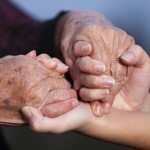
- Visit frequently. If you cannot visit frequently then try to have other family or friends visit. You can also stay in touch by phone. In our experience it is often a family member who uncovers serious neglect and abuse. It is also often the family that must advocate for treatment.
- Get to know the staff. You want to establish a relationship so that you know who to go to with problems and so you get important information about how your loved one is doing.
- Notice changes in condition. In a nursing home setting changes in condition (whether physical, mood or cognitive) are important and should be followed by the staff. Family members are often in a good position to notice changes based on a lifetime of interactions and bring them to the attention of the staff.
- Be involved in the care plan. Stay on top of the treatment plan and how issues that arise are being handled. Make sure that your parent is getting to express their wishes (to the full extent they are able).
- Take notes. Be observant. When the facility calls you to report incidents be sure to take notes. Similarly if you attend care meetings you should take notes.
- Take pictures. If there is a significant injury or change in condition, having a picture as documentation can go a very long way to getting action taken—whether corrective by the nursing home or through litigation. In our experience photographs can greatly impact the value of a case. Unfortunately few facilities take pictures—and things like bedsores (decubitus ulcers) are frequently mischarted or not charted. Having a picture will allow an expert to explain the severity of the wound and determine whether the facility was purposely misrepresenting the injury.
- Pay attention to call lights. Unanswered call lights are a sign that there may be neglect, poor staffing, and/or illegal understaffing. Whether call lights are left to ring for minutes on end can be a sign of a troubled facility. Many serious falls happen when elders cannot get prompt assistance when they use their call lights. If a resident cannot rely on help coming, they will often get out of bed themselves to use the bathroom and they can fall.
- Pay attention to repositioning. Bed sores can lead to death in addition to being excruciatingly painful. Bedridden residents need to be repositioned in bed at least every two hours. If this is not being done it is an indicator or poor quality of care. Talk to the staff if you see this happening.
- Do your research before choosing a nursing home—and keep tabs once your parent is admitted: Don’t rely on a placement company to choose the right place for your parent. Many people do not know that placement companies are paid hefty fees to send elders to certain nursing homes. As you can imagine the worst homes may have more trouble staying full and may pay the most. Instead do your own research. For instance, check out:
Be sure to read the complaints and citations. It will be a few hours well spent before placing your parent. After admission, keep tabs on new complaints and citations.
- Be on the lookout for billing fraud: Billing fraud is rampant. It costs the government pay programs billions of dollars each year. Even if the government is picking up the tab, keep an eye out for billing for services that are not actually provided. Look here for more on false claims.
Remember—if your parent is in immediate physical danger, call 911. You would think that the staff of a nursing home would do this—and they should; however, there have been instances of nursing homes having internal rules that require staff to call an owner or administrator before calling 911; which is reprehensible and can lead to tragedy.
If your parent is suffering on-going physical or financial abuse, or physical neglect there are resources available. At Cotchett, Pitre & McCarthy, LLP we have a long history of fighting for the rights of elders. More about CPM’s Elder Law Practice can be found here -- or feel free to contact me at amurphy@cpmlegal.com
There are also community based programs designed to help. For instance, you can contact Adult Protective Services (APS) or your long-term care ombudsman may be able to help if the older person lives in a nursing home or assisted living.
- Partner
Anne Marie Murphy is a Principal at Cotchett, Pitre & McCarthy LLP, where she practices civil litigation focusing on complex commercial litigation, class actions, public nuisance litigation, consumers’ rights and elder ...

